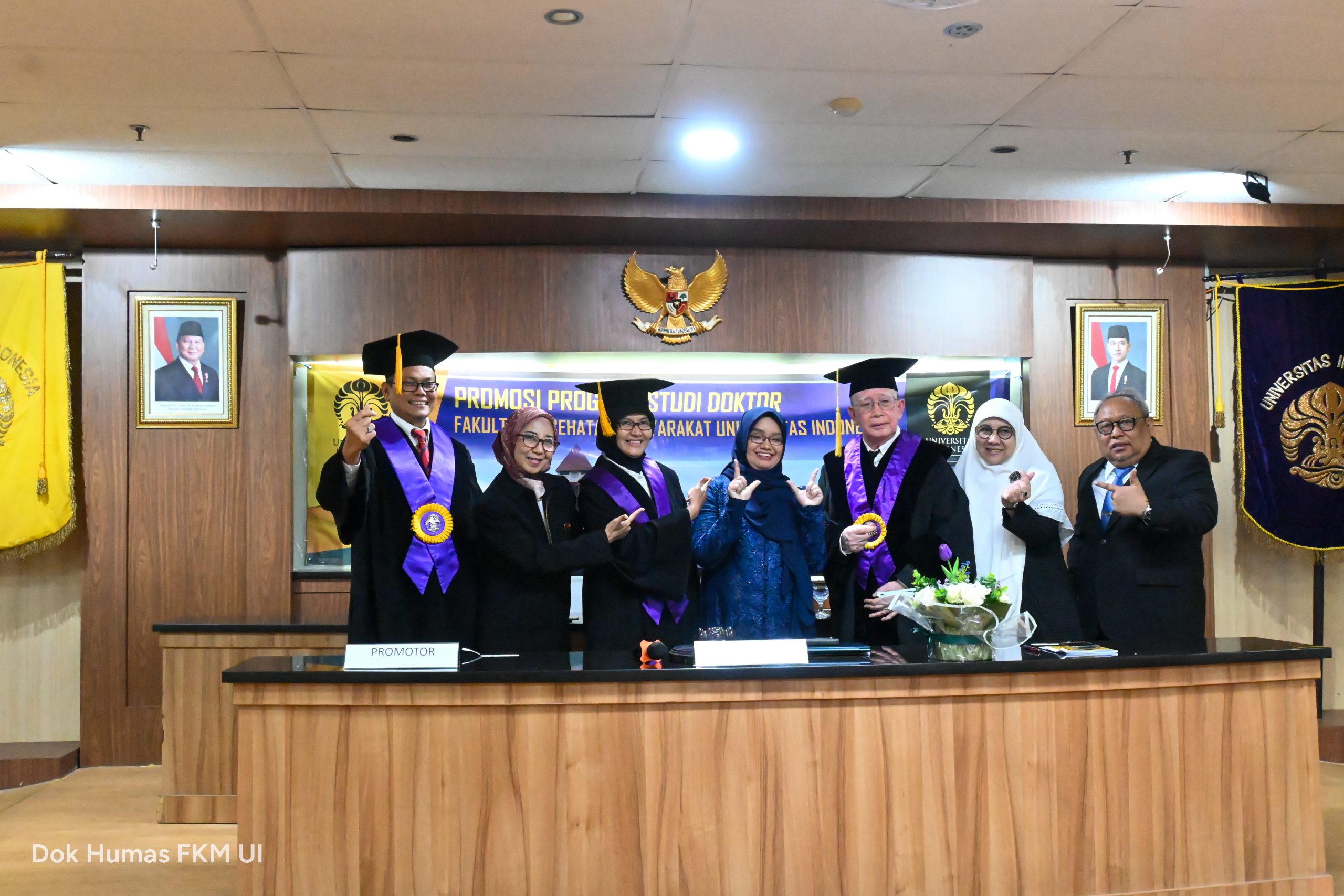Depok, September 30, 2025 – The Faculty of Public Health (FPH) Universitas Indonesia (UI) once again held a Doctoral Promotion Session in Public Health Sciences. The session took place in a hybrid format at the Doctoral Promotion Room, Building G, FPH UI, and via Zoom Meeting.
On this occasion, Eflita Meiyetriani officially defended her dissertation entitled “The Impact of the ‘Four Too’s’ Births on Children’s Linear Growth: An Analysis of the Indonesia Family Life Survey (IFLS) 2000, 2007, and 2014.” The session was chaired by Prof. Dr. Besral, S.K.M., M.Sc., with Prof. Dr. Budi Utomo, M.P.H., Ph.D. as the main supervisor, and Dr. Dian Kusuma, S.K.M., M.P.H., Sc.D., and Prof. Dr. Dra. Ratu Ayu Dewi Sartika, Apt., M.Sc. as co-supervisors.
Through her dissertation, Eflita examined the urgency of addressing the “Four Too’s” birth phenomena — too young, too old, too close in birth spacing, and too many children — in relation to children’s linear growth. Her research specifically assessed the strategic impact of preventing high-risk pregnancies in reducing stunting prevalence in Indonesia.
Using longitudinal data from the Indonesia Family Life Survey (IFLS) in 2000, 2007, and 2014, Eflita tracked more than a thousand children into adolescence. She employed multivariate statistical techniques to control for potential confounding variables such as socioeconomic status, parental education, environmental factors, and maternal health indicators (e.g., nutrition, illness). Eflita compared mothers who experienced one or more “too” conditions with those who did not experience any.
Eflita’s research revealed significant findings. She explained, “The prevalence of high-risk births categorized as the ‘Four Too’s’ in Indonesia reaches nearly 30 percent. Among these, short birth intervals were found to be the most consistent factor, doubling the risk of stunting.” Birth intervals of less than 24 months were consistently associated with an increased risk of stunting, even as children reached adolescence.
These findings reaffirm the importance of interventions during the preconception and conception periods. Eflita also emphasized the need for cross-sectoral policy interventions. “Family planning programs must be strengthened, particularly to prevent high-risk pregnancies. Moreover, nutrition interventions should not only focus on the first 1,000 days of life but must also extend into school-age and adolescence — the second window of opportunity,” she stated.
Eflita identified adolescence as this Second Window of Opportunity for nutritional interventions, crucial in breaking the intergenerational cycle of malnutrition. She underscored the urgency of addressing adolescent nutrition by sharing a personal story during her defense: “I was shocked when my eldest daughter, who’s in her first year of high school, was found to have a hemoglobin level of only 9 during an anemia screening.” She added that this experience illustrates how close and real nutritional issues like anemia are among adolescent girls — and why they must be prioritized in health interventions.
Targeted nutrition programs for adolescents, especially girls — such as the provision of iron supplementation — are therefore essential to ensure that future mothers enter pre-pregnancy in optimal nutritional condition. This, she stressed, is key to breaking the intergenerational cycle of malnutrition.
Following the discussion led by the chair, supervisors, and the examination committee — consisting of Prof. Dr. Budi Iman Santoso, M.P.H., Sp.OG(K); Dr. Sudibyo Alimoeso, M.A.; Helda Khusun, S.Tp., M.Sc., Ph.D.; Prof. Dr. dr. Hartono Gunardi, Sp.A(K), Subs.TKPS.; and Dr. Dwi Nastiti Iswarawanti, M.Sc. — Eflita Meiyetriani was declared to have passed and earned the degree of Doctor of Public Health Sciences with a GPA of 3.95 and the distinction of summa cum laude.
Eflita, a native of Padang and a researcher at the Southeast Asian Ministers of Education Organization Regional Centre for Food and Nutrition (SEAMEO RECFON), completed her doctoral studies in seven semesters. She is the 25th Doctoral graduate of FPH UI in 2025, the 364th graduate of the Public Health Doctoral Program, and the 477th doctoral graduate of FPH UI overall.
As a higher education institution committed to advancing public health in Indonesia, FPH UI continues to demonstrate its dedication to producing outstanding scholars. Through the expertise and insights gained, its doctoral graduates are expected to contribute to improving community well-being, strengthening the nation’s health resilience, and inspiring future generations to pursue impactful research for Indonesia’s progress. (EAR)

